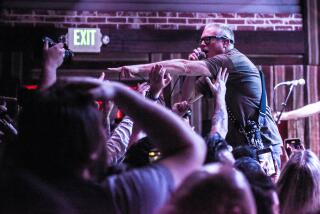POP REVIEW : Firehose Feeds the Flames at the Newport Roadhouse
NEWPORT BEACH â Carrying with it a reputation as a consistently brilliant live band, Firehose had plenty to contend with Saturday night as it took the stage at the Newport Roadhouse. About half the patrons who packed this tiny bar could barely see the band, if at all. The place clearly was built for drinking, not rocking.
Then there were the acoustic problems. Thanks to an aluminum-sheet ceiling that must be 50 feet high, walls tacked with plywood and an irregularly shaped room, performersâ sounds got lost. And opening acts Trotsky Icepick and Donât Mean Maybe, despite otherwise impressive sets, battled constantly with a sound system that rendered power chords muddy and tinny.
Still, in terms of raw energy and spontaneity on stage, Firehose has few peers in rock today--regardless of the conditions. Just give them a stage, a stack of amps and a couple of hundred fans, and theyâll take care of the rest.
In typical fashion, Firehose dished out 22 songs in one furious hour. It led the crowd through jazz-flavored spiels, hard funk and a sampler of country, along with, of course, a healthy portion of power chords.
The L.A. trio kicked out the jams immediately, opening with a blistering rendition of an obscenely titled Super Chunk number, one of five cover songs included on Firehoseâs just-released âLive Totem Poleâ EP.
Two songs later, they cut loose again with a version of last yearâs âDown With the Bass,â touching off an outbreak of slam dancing.
The slam pit, a recurring event throughout the set, was a curious foil to what was happening on stage. A tired antic from an era that refuses to die, it was revived amid a performance that was fresh, genuine and called for new directions in rock.
The set traversed the bandâs four studio albums, running the gamut from 1986âs guitar-driven âChemical Wireâ to âWalking the Cow,â a countrified number from last yearâs âFlyinâ the Flannelâ LP.
The show ended after 1 a.m. where it had begun, with covers from the âLive Totem Poleâ EP. The set concluded with inspired versions of âSophisticated Bitchâ--which, unexpectedly, is a natural for the band--and âRevolution Part 2.â
The guitar assaults that pervade Firehoseâs performances retain their potency because of the bandâs obsession with musical variety. Carrying forward the approach staked out by its ancestor, the late great Minutemen, Firehose is never content with a single hook, tempo or rhythm in any given song. Just as youâre grooving along with George Hurleyâs neo-bebop drum patterns, bassist Mike Watt or guitarist Ed Crawford lowers the boom with a crunching chord.
Watt, who is reportedly portraying Cuban leader Fidel Castro in an upcoming film, has taken on a thicker beard and paunch these days to suit the part. Looking like Fidel in flannel, Watt remains the fiery leader of the Firehose revolution. The marvel of his craft is how effortlessly he moves from thrashing his instrument to plunking intricate, throbbing bass lines from it.
Hurley continues to prove himself as one of rockâs unsung drummers. He is as good at playing jazz licks as he is at playing rock, an approach that has always been at the heart of the music of both Firehose and the Minutemen.
The bandâs most notable sign of growth, however, comes from Crawford. A musical neophyte when he hooked up with Watt and Hurley to form Firehose in 1986, Crawford has since developed into a skilled guitarist and lead vocalist, as well as a commanding stage performer.
After all the years and performances, it seems remarkable that Firehose is still toiling away in places with shoddy sound and tiny crowds.
Leading up the Firehose set, Orange Countyâs Donât Mean Maybe turned in an excellent, half-hour performance.
Combining dissonance and infectious melodies, the trio essentially follows a single musical avenue. But the approach is lively and adventuresome enough to keep changing lanes, underscored by the cohesiveness of the bandâs playing.
Similarly, Trotsky Icepick opened with an act worthy of the headliner, complicated only by logistic problems. The quintet is short on new ideas but makes up for it with passion and sincerity. It made its collection of retread post-punk sounds come off more interesting than on record, while rattling the liquor bottles above the bar.
More to Read
The biggest entertainment stories
Get our big stories about Hollywood, film, television, music, arts, culture and more right in your inbox as soon as they publish.
You may occasionally receive promotional content from the Los Angeles Times.






